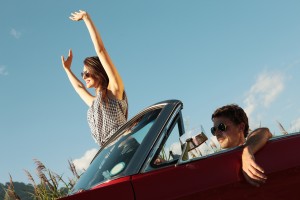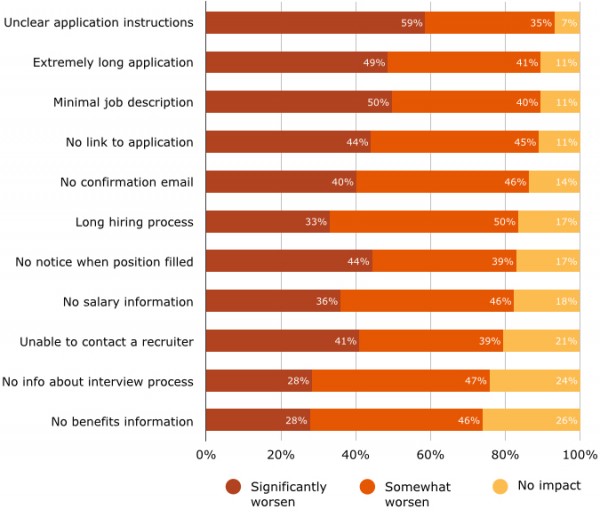Are You Truly Giving Candidates a Great Experience?

But if you spend your time reading sites like Recruiter.com, you probably knew that already. What you might not have known are the common causes of bad candidate experiences — but thanks to a recent survey from Software Advice, you do now.
Why Candidate Experiences Go Wrong
Software Advice surveyed 379 random people from around the world who had applied for a full-time job in the last 12 months. According to these job seekers, the leading causes of bad candidate experience include:
- unclear application instructions (93 percent);
- extremely long applications (89 percent);
- and no notice when a position was filled (83 percent).
Here’s the full breakdown of common drivers of bad candidate experience:

The surveyed job seekers also offered some tips on how employers could improve candidate experience, including:
- more communication (34 percent);
- human contact (14 percent);
- and notification when a candidate was passed over for the job (28 percent).
Do Recruiters Really Know What Candidates Are Experiencing?
What’s most interesting about jobs data from the survey, in my mind, is the fact that it may suggest a divide between candidates’ and recruiters’ approaches to what constitutes a good candidate experience. A significant portion of the 191 recruiters surveyed by Software Advice (26 percent) said their ATSs were contributing factors to positive candidate experience.
See the following chart for a breakdown of what recruiters believe are the top causes of positive candidate experience:

Now, contrast what these recruiters are saying with what candidates themselves are reporting. According to a study from Jibe and Kelton Global, 80 percent of job seekers find the online application process “time-consuming and stressful.” This aligns with Software Advice’s own survey results, in which job seekers expressed distaste for extremely long applications (time-consuming) and unclear application instructions (stressful).
The disconnect between how recruiters feel about ATSs and how candidates feel about them makes me wonder if recruiters are really seeing candidate experience through the eyes of job seekers. Sure, ATSs make recruiters’ lives easier, but do they always make candidates’ lives easier? It doesn’t seem that way: according to the Jibe/Kelton Global study mentioned above, three in five job seekers say online job applications are more difficult to fill out than mortgage, student loan, or health insurance applications.
Does that seem right to you?
One could argue that the “online application process” that job seekers bemoaned in the Jibe/Kelton Global survey is not necessarily the same as the ATS application process, and they’d be right. However, I’d wager that ATSs account for a significant portion of the online application process, given that roughly 60 percent of mid-sized businesses and 75 percent of large companies currently use them. I’d also point out that anti-ATS sentiment is not uncommon: some experts have gone so far as to suggest that ATSs have “ruined recruiting, hiring, and [the] job search.”
(Plus, I can tell you from my own experiences as a job seeker that I downright loathe applying through ATSs. Oh, you want me to upload my resume and then re-enter all the same exact information on a different form? Great!)
But enough with the negativity — I believe I’ve proven my point, or at least given you something to think about. Now for the good news.
Clearly, not all recruiters believe their ATSs are the keys to candidate experience: 35 percent of them told Software Advice that excellent recruiter training allows them to give candidates a positive experience. Given what people who are far more knowledgeable than I am say, I’m inclined to agree that recruiters make the real difference. Software can help, but it’s not the be-all and end-all.
I should also note that a lot of innovation is currently occurring in the ATS space, with many providers adopting social media integration, streamlined designs, and mobile optimization, to name just a few of the trends. This bodes well for the future of the ATS — but for now, I think it’s safer to say that the candidate experience is really in the hands of recruiters, not ATSs.
Let me end with a suggestion: recruiters, your ATS may make your life easier, but it may also make your candidates’ lives harder. Use the extra time and energy your ATS frees up for you to ensure that your candidates are having the best experience possible. Don’t wait for the software to do that for you.

